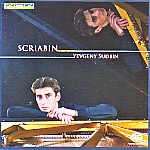This is on balance the most well-chosen, brilliantly played single-disc selection of Scriabin’s piano music currently available. The repertoire offers three of the composer’s best sonatas and includes works ranging from the beginning of his career (the Étude Op. 2 and the charming Four Marzurkas from Op. 3) right through to his most mature, radical phase (the “Black Mass” Sonata No. 9). Pianist Yevgeny Sudbin intersperses the shorter works between the three sonatas, beginning with the scintillating Étude Op. 8 No. 12, and concluding with a particularly lilting, luscious reading of the Valse Op. 38. There’s a lot of music and a vast range of expression packed into this disc’s 57 minutes, making for a spectacular concert that encourages you to listen straight through at one sitting.
The performances of all three sonatas are remarkable for their rhythmic definition (no chromatic sludge here) and for the remarkable sense of languorous flow that Sudbin achieves through minutely calculated dynamic shadings. In the dreamy first movement of the Second sonata you can really hear the difference between piano and pianissimo, and the diminuendos on the motto theme’s closing triplets are beautifully judged. The Fifth sonata’s presto 6/8 sections project very powerfully, sort of like Ravel on speed, and when Scriabin asks for “luminosita” at the climax, that’s exactly what Sudbin provides, with no trace of brittleness in his instrument’s treble register.
The “Black Mass” sonata can either be great fun (in the way that a horror movie is fun), or an ungodly mess. Sudbin has fun. Who knows exactly what Scriabin had in mind when he wrote expressive directions like “with increasingly poisoned sweetness” over the sonata’s more voluptuous passages? Sudbin plays them to the hilt, arriving at the Alla Marcia climax with tremendous power and perfect timing. He’s a bit quicker in this sonata than Horowitz, but whatever loss in atmosphere this might have entailed is more than compensated for by Sudbin’s huge dynamic range and subtleties of touch.
Among the shorter items not previously mentioned, the Poème from Op. 59 stands out as a highly polished little gem. Sudbin contributes his own very entertaining booklet notes which, like the music itself, go over the top now and then, and BIS’s SACD surround sonics are incredibly lifelike, equally so in regular stereo. Even if you don’t normally warm to Scriabin’s hyper-romantic idiom, I guarantee that you will find this recital thrilling. [10/1/2007]
































